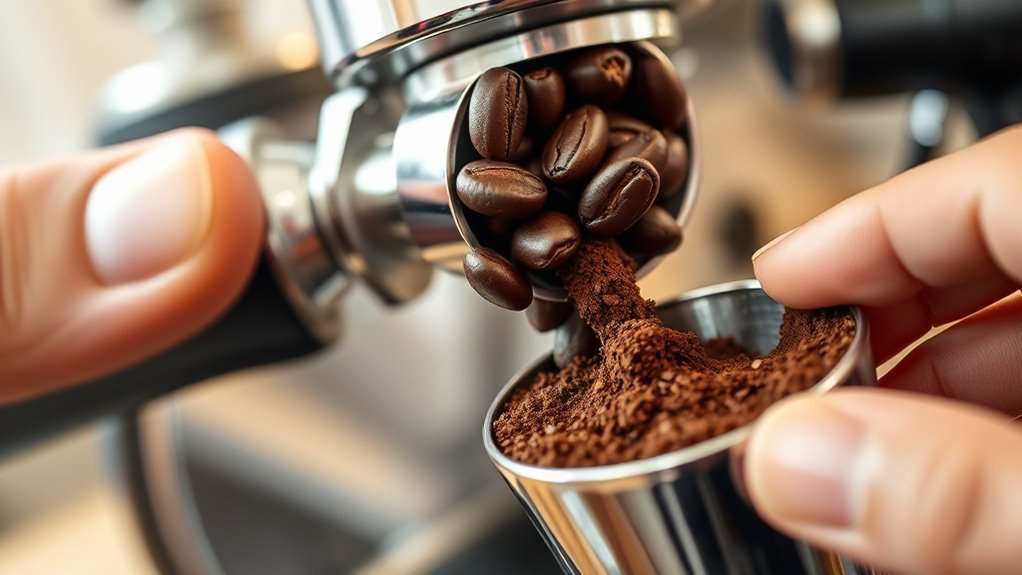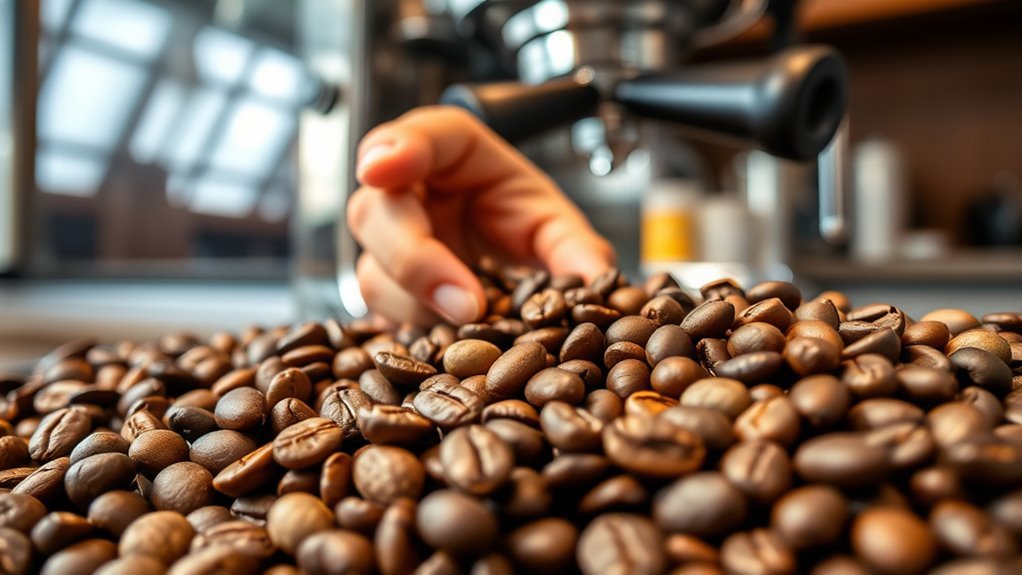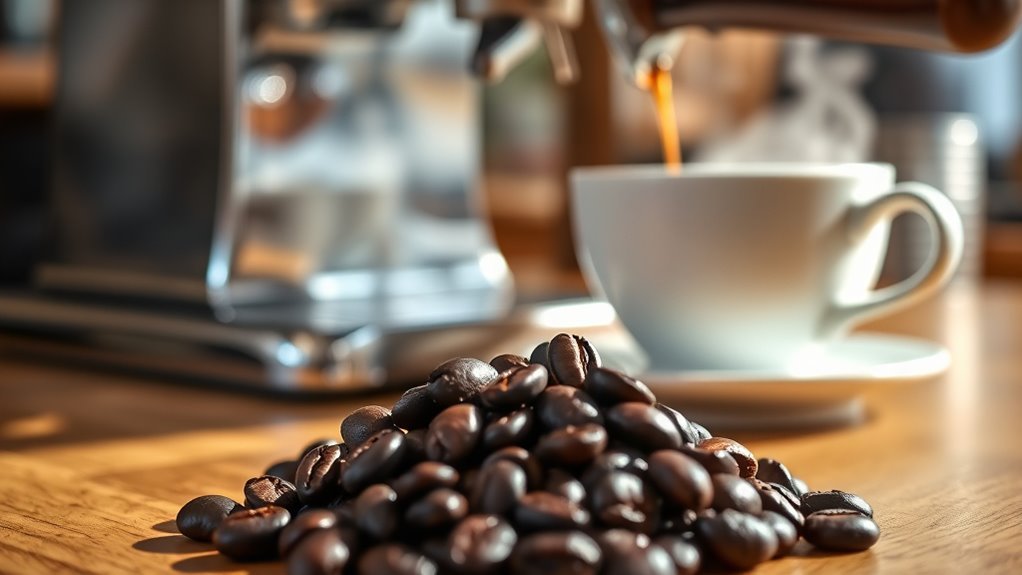Can You Use Regular Coffee Beans for Espresso
Yes, you can use regular coffee beans for espresso. The key lies in the brewing method and grind size, not just the type of bean. Whether you choose bright Arabica or robust Robusta, adjustments in grind and extraction techniques can enhance flavor. Regular beans can yield delightful espresso shots, although they may lack the depth of specialty blends. If you want to maximize your espresso experience with regular beans, there’s more to explore about techniques and flavor profiles.
Understanding Espresso and Coffee Beans

While many coffee enthusiasts believe that espresso requires specific beans, understanding the fundamentals of espresso and coffee beans reveals that this isn’t necessarily the case. Espresso, with its rich origins in Italy, can be crafted from various coffee varieties. The key lies in the brewing method, rather than the bean type itself. You can use any coffee bean, whether it’s a bright Arabica or a bold Robusta, as long as you adjust the grind size and brewing technique appropriately. The espresso extraction process emphasizes the flavors and oils, allowing diverse beans to shine. So, if you’ve got a favorite regular coffee bean, don’t hesitate to experiment; it might just surprise you in the espresso cup.
The Difference Between Espresso Beans and Regular Coffee Beans
Although many coffee drinkers might assume there’s a strict distinction between espresso beans and regular coffee beans, the differences often lie more in the preparation and roasting process than in the beans themselves. Espresso characteristics typically emerge from a darker roast, which intensifies flavors and oils, enhancing the crema you see atop a well-prepared shot. That said, any coffee bean can yield espresso if roasted properly. Bean origins also play a significant role; beans from different regions offer unique flavor profiles that can change the espresso experience. So, while you might choose a specific blend for its espresso characteristics, don’t feel confined to labeled “espresso beans” — your regular coffee beans can deliver a delightful shot too.
Grind Size: Key to Espresso Extraction

Grind size plays an essential role in espresso extraction, influencing the flavor and quality of your shot. The right grind consistency allows for peak extraction time, ensuring you get the most from your regular coffee beans. A finer grind helps achieve a balanced extraction, while a coarser grind could lead to under-extraction, resulting in sour flavors.
| Grind Size | Effects on Extraction |
|---|---|
| Fine | Enhanced flavor intensity |
| Medium | Balanced, versatile flavor |
| Coarse | Sour, weak taste |
To reveal the full potential of your espresso, experiment with grind size adjustments. Achieving the perfect consistency can elevate your coffee experience, giving you that rich, bold shot you crave.
Brewing Methods: Can You Adapt Your Technique?
How can you adapt your brewing technique to maximize the potential of regular coffee beans for espresso? First, consider your brewing techniques. While espresso typically requires finely ground beans, you can experiment with slightly coarser grinds to see how they affect extraction methods. Adjust your brewing time and water temperature, as these factors greatly influence flavor. A shorter extraction time may work better with regular beans, preventing over-extraction that can lead to bitterness. Additionally, try different brewing pressures, if your equipment allows, to find the right balance. Remember that each bean type has unique characteristics; be open to refining your approach until you achieve a satisfying cup. With some experimentation, you can reveal the potential of your regular coffee beans.
Flavor Profiles: What to Expect From Regular Coffee Beans

When brewing espresso with regular coffee beans, understanding their flavor profiles can greatly enhance your experience. Regular beans often yield a range of flavor nuances that reflect their unique bean origins. For instance, beans from South America might present a bright acidity with chocolate undertones, while African beans could introduce fruity or floral notes. These subtle hints can transform your espresso into a complex, multidimensional beverage. However, keep in mind that regular coffee beans may lack the depth and richness typical of specialty espresso blends. By exploring various bean origins, you can identify which flavors resonate with your palate, allowing for a more personalized espresso experience that embraces the freedom of choice in your coffee journey.
Tips for Making Espresso With Regular Coffee Beans
Although making espresso with regular coffee beans presents unique challenges, you can achieve a satisfying brew by paying attention to key factors in the preparation process. Start by choosing medium to dark roast beans, as they typically yield better flavors for espresso recipes. Grind them finely, aiming for a consistency similar to table salt; this helps with extraction. Confirm your espresso machine is properly calibrated, with the right water temperature and pressure. Experiment with brew time to find the perfect balance in flavor. Finally, consider coffee pairings—try different milk types or syrups to enhance your drink’s profile. With these tips, you’ll uncover the potential of regular coffee beans, offering you a liberating espresso experience.
Experimenting With Blends and Roasting Levels

While exploring the nuances of espresso, experimenting with blends and roasting levels can greatly elevate your coffee experience. To dive deeper into flavor experimentation, consider the following:
- Blend Composition: Combine beans from different regions to create unique flavor profiles. For example, pairing fruity Ethiopian beans with chocolatey Brazilian ones can yield a balanced cup.
- Roast Profiling: Adjusting roast levels impacts acidity and sweetness. A lighter roast may highlight floral notes, while a darker roast emphasizes body and richness.
- Tasting Notes: Keep a journal to document your findings. Note the distinct flavors that emerge from varying blends and roasts to refine your palate.
Frequently Asked Questions
Can I Use Flavored Coffee Beans for Espresso?
Did you know that around 60% of coffee drinkers prefer flavored coffee? If you’re considering using flavored coffee beans for espresso, it’s definitely possible. However, keep in mind that the espresso taste might change considerably, as the flavors can overpower the natural coffee notes. Experimenting with flavored beans can be fun, but be prepared for a unique experience that may differ from traditional espresso. Enjoy the freedom to explore different flavor profiles!
Are There Specific Coffee Bean Brands Recommended for Espresso?
When it comes to espresso brands, you’ll want to focus on those that emphasize rich, bold flavors with a balanced acidity. Look for beans with characteristics like a medium to dark roast, which often enhance the crema and overall body of your espresso. Brands like Lavazza, Illy, and Stumptown are popular choices. Experimenting with different origins can also yield unique tasting notes, allowing you to find your perfect espresso experience.
How Does Roast Date Affect Espresso Quality?
Have you ever wondered how the roast date might alter your espresso experience? The freshness impact of coffee beans is vital; a bean’s roast profile can dictate flavor intensity and aroma. Beans roasted within the last few weeks typically yield a vibrant shot, while older beans may result in dull, lifeless espresso. Choosing the right roast date is essential if you want to access the full potential of your brew and savor every sip.
Can I Mix Espresso Beans With Regular Coffee Beans?
You can mix espresso beans with regular coffee beans, but it’s all about balance. Creating espresso blends involves experimenting with different coffee ratios to achieve your desired flavor profile. Combining beans can enhance complexity, but make certain the regular beans complement the espresso beans rather than overpower them. Adjusting the ratios allows you to explore unique tastes, giving you the freedom to customize your brew according to your personal preferences. Enjoy the journey!
Will Using Regular Beans Affect My Espresso Machine’s Performance?
Using regular beans in your espresso machine can affect its performance, particularly in machine efficiency and brewing consistency. Regular beans may not extract flavors effectively, leading to inconsistent shots and potential strain on your machine. While you might enjoy some unique flavors, the lack of proper grind and roast can hinder the overall espresso experience. If you value freedom in your coffee choices, be mindful of how those beans impact your brewing setup.






